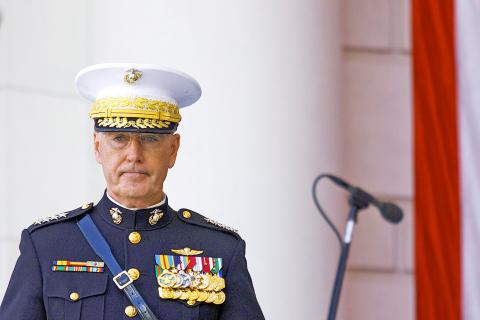The US military’s top general on Wednesday said that Chinese President Xi Jinping (習近平) reneged on promises not to militarize the South China Sea and called for “collective action” to hold Beijing responsible.
Marine Corps General Joseph Dunford, chairman of the Joint Chiefs of Staff, said he was not calling for military action, but that there was a need to enforce international laws.
“The fall of 2016, President Xi Jinping promised [then-US] president [Barack] Obama that they would not militarize the islands. So what we see today are 10,000-foot [3,048m] runways, ammunition storage facilities, routine deployment of missile defense capabilities, aviation capabilities and so forth,” he said in a talk on US security and defense at the Brookings Institution in Washington. “So clearly they have walked away from that commitment.”

Photo: AFP
“The South China Sea is in my judgement not a pile of rocks,” he said, referring to the series of reefs and outcrops that have been claimed as territory by China, reclaimed and expanded to accommodate military forces and large aircraft. “What is at stake in the South China Sea and elsewhere where there are territorial claims is the rule of law, international laws, norms and standards. When we ignore actions that are not in compliance with international rules, norms and standards, we have just set a new standard.”
“I’m not suggesting a military response,” Dunford said. “What needs to happen ... is coherent collective action to those who violate international norms and standards. They need to be held accountable in some way so that future violations are deterred.”
Washington has been frustrated by an inability to stall China’s aggressive military colonization of the South China Sea, which rejects conflicting territorial claims by Taiwan, Vietnam, Malaysia, Brunei, Indonesia and the Philippines.
The US has sent navy vessels through the areas claimed by China as “international freedom of navigation operations,” but otherwise has found responding difficult.
Dunford said that building on the Chinese-claimed reefs had slowed, but “I assume that’s because the islands have now been developed to the point where they provide the military capability that the Chinese required them to have.”

NATIONAL SECURITY THREAT: An official said that Guan Guan’s comments had gone beyond the threshold of free speech, as she advocated for the destruction of the ROC China-born media influencer Guan Guan’s (關關) residency permit has been revoked for repeatedly posting pro-China content that threatens national security, the National Immigration Agency said yesterday. Guan Guan has said many controversial things in her videos posted to Douyin (抖音), including “the red flag will soon be painted all over Taiwan” and “Taiwan is an inseparable part of China,” while expressing hope for expedited “reunification.” The agency received multiple reports alleging that Guan Guan had advocated for armed reunification last year. After investigating, the agency last month issued a notice requiring her to appear and account for her actions. Guan Guan appeared as required,

Japan and the Philippines yesterday signed a defense pact that would allow the tax-free provision of ammunition, fuel, food and other necessities when their forces stage joint training to boost deterrence against China’s growing aggression in the region and to bolster their preparation for natural disasters. Japan has faced increasing political, trade and security tensions with China, which was angered by Japanese Prime Minister Sanae Takaichi’s remark that a Chinese attack on Taiwan would be a survival-threatening situation for Japan, triggering a military response. Japan and the Philippines have also had separate territorial conflicts with Beijing in the East and South China

A strong cold air mass is expected to arrive tonight, bringing a change in weather and a drop in temperature, the Central Weather Administration (CWA) said. The coldest time would be early on Thursday morning, with temperatures in some areas dipping as low as 8°C, it said. Daytime highs yesterday were 22°C to 24°C in northern and eastern Taiwan, and about 25°C to 28°C in the central and southern regions, it said. However, nighttime lows would dip to about 15°C to 16°C in central and northern Taiwan as well as the northeast, and 17°C to 19°C elsewhere, it said. Tropical Storm Nokaen, currently

PAPERS, PLEASE: The gang exploited the high value of the passports, selling them at inflated prices to Chinese buyers, who would treat them as ‘invisibility cloaks’ The Yilan District Court has handed four members of a syndicate prison terms ranging from one year and two months to two years and two months for their involvement in a scheme to purchase Taiwanese passports and resell them abroad at a massive markup. A Chinese human smuggling syndicate purchased Taiwanese passports through local criminal networks, exploiting the passports’ visa-free travel privileges to turn a profit of more than 20 times the original price, the court said. Such criminal organizations enable people to impersonate Taiwanese when entering and exiting Taiwan and other countries, undermining social order and the credibility of the nation’s